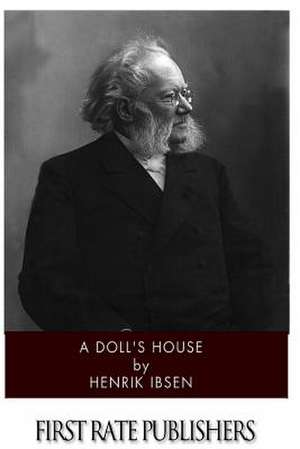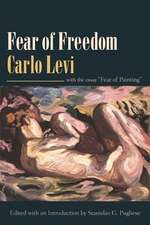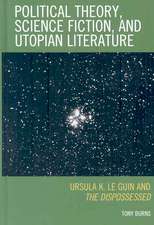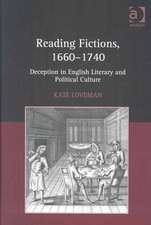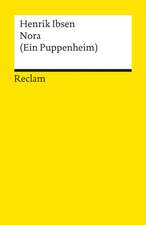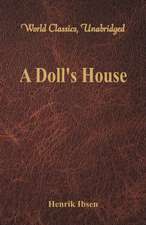A Doll's House
Autor Henrik Ibsen Traducere de William Archeren Limba Engleză Paperback
| Toate formatele și edițiile | Preț | Express |
|---|---|---|
| Paperback (55) | 31.67 lei 3-5 săpt. | +4.28 lei 4-10 zile |
| NICK HERN BOOKS – 20 apr 1994 | 31.67 lei 3-5 săpt. | +4.28 lei 4-10 zile |
| Mint Editions – feb 2021 | 32.73 lei 3-5 săpt. | +5.02 lei 4-10 zile |
| CREATESPACE – | 40.89 lei 3-5 săpt. | |
| CREATESPACE – | 41.24 lei 3-5 săpt. | |
| CreateSpace Independent Publishing Platform – | 41.32 lei 3-5 săpt. | |
| – | 42.56 lei 3-5 săpt. | |
| CreateSpace Independent Publishing Platform – | 43.56 lei 3-5 săpt. | |
| CreateSpace Independent Publishing Platform – | 47.34 lei 3-5 săpt. | |
| CreateSpace Independent Publishing Platform – | 48.45 lei 3-5 săpt. | |
| CREATESPACE – | 49.56 lei 3-5 săpt. | |
| Arcturus Publishing – 31 mai 2022 | 50.12 lei 3-5 săpt. | +4.72 lei 4-10 zile |
| CREATESPACE – | 50.13 lei 3-5 săpt. | |
| Rowman & Littlefield – 19 dec 1999 | 50.81 lei 3-5 săpt. | +7.29 lei 4-10 zile |
| – | 54.20 lei 3-5 săpt. | |
| CREATESPACE – | 54.43 lei 3-5 săpt. | |
| stanfordpub.com – 14 ian 2019 | 54.98 lei 3-5 săpt. | |
| – | 55.19 lei 3-5 săpt. | |
| Denton & White – | 56.88 lei 3-5 săpt. | |
| – | 58.45 lei 3-5 săpt. | |
| CREATESPACE – | 61.36 lei 3-5 săpt. | |
| – | 66.40 lei 3-5 săpt. | |
| NICK HERN BOOKS – 26 sep 2024 | 68.52 lei 3-5 săpt. | +5.11 lei 4-10 zile |
| Indoeuropeanpublishing.com – 30 mai 2019 | 69.50 lei 3-5 săpt. | +7.37 lei 4-10 zile |
| – | 71.25 lei 3-5 săpt. | |
| Bloomsbury Publishing – 12 mai 2021 | 78.48 lei 3-5 săpt. | +17.86 lei 4-10 zile |
| Bloomsbury Publishing – 28 aug 2013 | 79.07 lei 3-5 săpt. | +12.79 lei 4-10 zile |
| Theatre Communications Group – 20 iun 2016 | 80.19 lei 3-5 săpt. | |
| Cambridge University Press – 29 sep 1995 | 84.21 lei 3-5 săpt. | +6.11 lei 4-10 zile |
| Les Prairies Numeriques – 23 iul 2020 | 104.64 lei 3-5 săpt. | |
| BROADVIEW PR – 31 dec 2023 | 127.33 lei 3-5 săpt. | +24.21 lei 4-10 zile |
| CREATESPACE – | 45.36 lei 6-8 săpt. | |
| CreateSpace Independent Publishing Platform – | 46.35 lei 6-8 săpt. | |
| CREATESPACE – | 46.59 lei 6-8 săpt. | |
| CreateSpace Independent Publishing Platform – | 46.59 lei 6-8 săpt. | |
| Watchmaker Publishing – 24 ian 2013 | 50.85 lei 6-8 săpt. | |
| Digireads.com – 31 dec 2004 | 52.95 lei 6-8 săpt. | |
| CREATESPACE – | 53.63 lei 6-8 săpt. | |
| SC Active Business Development SRL – 13 apr 2017 | 58.51 lei 38-44 zile | |
| Digireads.com – 13 sep 2021 | 58.85 lei 6-8 săpt. | |
| Createspace – 27 noi 2012 | 61.18 lei 6-8 săpt. | |
| Serenity Publishers, LLC – 31 dec 2008 | 62.54 lei 6-8 săpt. | |
| – | 65.44 lei 6-8 săpt. | |
| Lector House – 6 mai 2019 | 72.49 lei 6-8 săpt. | |
| Binker North – 24 dec 2020 | 79.05 lei 6-8 săpt. | |
| Bloomsbury Publishing – 4 feb 2004 | 79.70 lei 6-8 săpt. | |
| Public Park Publishing – 4 ian 2020 | 83.18 lei 6-8 săpt. | |
| Maple Press – 2014 | 88.74 lei 6-8 săpt. | |
| Read & Co. Classics – 21 iun 2018 | 96.80 lei 6-8 săpt. | |
| – | 98.06 lei 6-8 săpt. | |
| Simon & Brown – 2 oct 2018 | 106.44 lei 38-44 zile | |
| Samuel French Ltd – 29 apr 2015 | 106.80 lei 6-8 săpt. | |
| Book Jungle – 2 aug 2009 | 110.45 lei 6-8 săpt. | |
| Sovereign – 3 aug 2018 | 125.36 lei 6-8 săpt. | |
| TREDITION CLASSICS – 31 oct 2011 | 130.52 lei 6-8 săpt. | |
| Kessinger Publishing – 13 ian 2009 | 186.35 lei 38-44 zile | |
| Hardback (4) | 124.46 lei 6-8 săpt. | |
| Public Park Publishing – 16 ian 2020 | 124.46 lei 6-8 săpt. | |
| Simon & Brown – 2 oct 2018 | 159.35 lei 38-44 zile | |
| NuVision Publications – 17 mai 2009 | 177.45 lei 38-44 zile | |
| Indoeuropeanpublishing.com – 30 mai 2019 | 183.12 lei 6-8 săpt. |
Preț: 40.89 lei
Nou
Puncte Express: 61
Preț estimativ în valută:
7.83€ • 8.50$ • 6.58£
7.83€ • 8.50$ • 6.58£
Carte disponibilă
Livrare economică 31 martie-14 aprilie
Preluare comenzi: 021 569.72.76
Specificații
ISBN-13: 9781499379198
ISBN-10: 1499379196
Pagini: 78
Dimensiuni: 152 x 229 x 4 mm
Greutate: 0.12 kg
Editura: CREATESPACE
ISBN-10: 1499379196
Pagini: 78
Dimensiuni: 152 x 229 x 4 mm
Greutate: 0.12 kg
Editura: CREATESPACE
Descriere
Descriere de la o altă ediție sau format:
Nora Helmer, wife to Torvald and mother of three children, appears to enjoy living the life of a pampered, indulged child. But as her economic dependence becomes brutally clear, Nora's acceptance of the status quo undergoes a profound change. To the horror of the bewildered Torvald, himself caught in the tight web of a conservative society which de
Nora Helmer, wife to Torvald and mother of three children, appears to enjoy living the life of a pampered, indulged child. But as her economic dependence becomes brutally clear, Nora's acceptance of the status quo undergoes a profound change. To the horror of the bewildered Torvald, himself caught in the tight web of a conservative society which de
Notă biografică
Henrik Johan Ibsen was a Norwegian writer and theatre director who lived from 20 March 1828 to 23 May 1906. He is credited with helping to build modernism in theatre. His best-known works are Rosmersholm, The Master Builder, Brand, Peer Gynt, An Enemy of the People, Emperor and Galilean, Hedda Gabler, Ghosts, The Wild Duck, When We Dead Awaken, Emperor and Galilean, and A Doll's House. In Skien, Norway, Henrik Johan Ibsen was born into a wealthy merchant family. His forefathers were mostly wealthy city merchants and shipowners or members of the Upper Telemark "aristocracy of officials." Ibsen quit school when he was fifteen. Henrik Wergeland and Peter Christen Asbjrnsen and Jrgen Moe's Norwegian folktales served as inspiration for him. Under the alias "Brynjolf Bjarme," he published his first play, Catilina (1850), but it was never staged. He would only make a few trips to Norway during the following 27 years, spending most of them in Germany and Italy.After suffering many strokes, Ibsen passed away at his house at Arbins gade 1 in Kristiania (now Oslo) in March 1900. He was laid to rest at Oslo's Vr Frelsers Gravlund, often known as "The Graveyard of Our Savior." Ibsen exclaimed "On the contrary" ("Tvertimod!") as his final words before passing away.
Caracteristici
Simon Stephens is highly regarded as a playwright, especially among young people, and so his take on a classic play will hold much interest among the drama and student communities.
Recenzii
Simon Stephens's agile new version [is] . . . quick and clear and full of subtle touches
A sensible, sensitive and spirited version . . . that chimes with the debt-laden times we're trapped in and poses still-pressing questions
The supple new version of the text by Simon Stephens is [a] great plus point . . . in this definitive take on a classic
An astute, often savagely funny version by Simon Stephens . . . And as the doll at the play's heart and hearth cracks like porcelain and the woman emerges, it's with a force that's shattering.
Simon Stephens's new English-language version of the text . . . makes the characters' anxieties feel contemporary despite the period dress. "Feminism" may not have been in Ibsen's vocabulary, but he was undoubtedly concerned with the roles we all play and why.
A sensible, sensitive and spirited version . . . that chimes with the debt-laden times we're trapped in and poses still-pressing questions
The supple new version of the text by Simon Stephens is [a] great plus point . . . in this definitive take on a classic
An astute, often savagely funny version by Simon Stephens . . . And as the doll at the play's heart and hearth cracks like porcelain and the woman emerges, it's with a force that's shattering.
Simon Stephens's new English-language version of the text . . . makes the characters' anxieties feel contemporary despite the period dress. "Feminism" may not have been in Ibsen's vocabulary, but he was undoubtedly concerned with the roles we all play and why.
